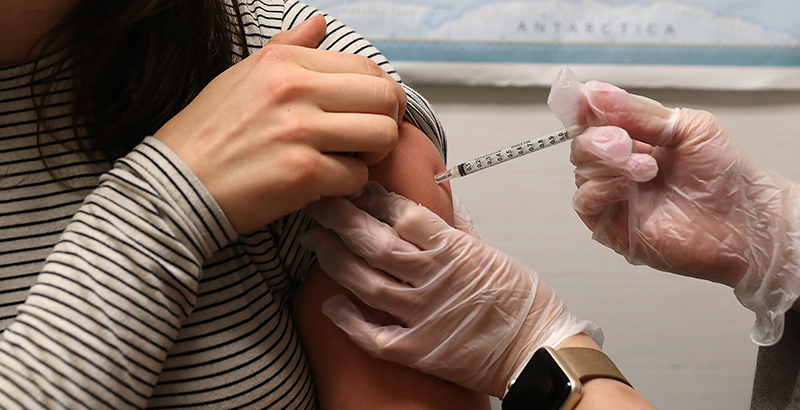7 Surprising Lessons From the 2019 Measles Outbreak: Teens Defying Parents on Vaccines, Affected Children Left More Susceptible to Other Illnesses & More

The World Health Organization declared “vaccine hesitancy” one of the top 10 threats to global health in 2019. Already this year that threat is evident across the United States, where regions with high rates of vaccine exemptions have been hit particularly hard by measles outbreaks since New Year’s.
Doctors say the infection has reappeared in part because of persistent misinformation about vaccines that thrives in parent groups on Facebook. But as the illness has spread, some parents and young people are reconsidering their decisions about immunizations, while state lawmakers are looking for ways to prevent future outbreaks.
The Centers for Disease Control and Prevention declared measles eliminated from the United States in 2000, but five outbreaks have been reported so far in 2019, infecting dozens of people. The CDC defines an outbreak as three or more cases of the illness in a given region.
No measles deaths have been reported in the United States since Jan. 1, but the virus can be deadly, especially for children. Seventy people, mostly children, have died of the illness in the Philippines this year, where there has been widespread fear about vaccines in recent years. Pediatricians recommend that children receive the doses of the MMR vaccine — which protects against measles, mumps, and rubella — at 12 months and between the ages of 4 and 6, or earlier if they will be traveling internationally.
Here are 7 things to know about the ongoing measles outbreaks.
1 Measles broke out in places with high rates of parents who opt their children out of vaccines.
Numerous cases of the illness have been reported in communities that have high rates of parents who have refused to vaccinate their children. Parts of New York, Washington, and Texas have been especially hard hit.
In Washington and Oregon, between 7 percent and 8 percent of children are not vaccinated, and Washington is experiencing a state of emergency because of the outbreak. In Clark County, Washington, for example, nearly a quarter of kindergartners had not received all their recommended vaccines before starting school in 2017-18, according to USA Today. At some schools, the rate of unvaccinated students was as high as 40 percent. Clark County has had more than 50 confirmed cases of measles since Jan. 4.
2 Since the outbreak started, some of those places are experiencing high demand for vaccines.
Demand for the vaccine has surged in Clark County, where one clinic told NBC News the number of vaccines administered jumped 450 percent year over year, from 263 in January 2018 to 1,444 in January 2019.
No shortages of the vaccine have been reported.
3 Young people are getting themselves vaccinated, even if they have to defy their parents to do it.
An Ohio teen used Reddit to get information about vaccines and ultimately decided to get the immunizations at age 18 even though his mother opposes vaccines and never had him vaccinated as a child.
“My parents think vaccines are some kind of government scheme. … I’ve never been vaccinated for anything, God knows how I’m still alive,” Ethan Lindenberger posted on the online forum. “Where do I go to get vaccinated? Can I get vaccinated at my age?”
A Georgia teen shared a similar story, telling NBC News she was able to get her vaccines only when she moved out of her mother’s home and started living with her father.
4 Those who have not been vaccinated, especially those who have underlying health problems, are most in danger from a measles outbreak.
During a measles outbreak, those who have not been vaccinated are at the highest risk of contracting the infection.
Because the vaccine is 97 percent to 98 percent effective, it is “very, very unusual” for a person who has received the immunization to come down with the illness, said William Schaffner, an infectious disease specialist at Vanderbilt University Medical Center. Schaffner said he believes that all people who can receive the vaccine have a responsibility to do so in order to protect those who cannot.
“If you don’t get vaccinated, you not only put your child at risk, but other children in the community, particularly those who have an underlying illness or require a treatment that does not permit them to get vaccinated themselves,” he told The 74. “And the way we protect those children is by having all the other children vaccinated so the measles virus can’t find them. We call that putting a cocoon of protection around those frail children.”
Schaffner stressed that the vaccine is safe and has not been linked to autism, which is one reason parents refuse the vaccine.
Newborn babies receive some immunity from their mothers, if they’ve been vaccinated, but until infants receive their own vaccinations, they should only be around people who have received the immunization or older people who have already had measles, Schaffner said.
Measles is extremely contagious, but unvaccinated people who have been exposed to the virus can prevent the infection if they receive the vaccine immediately after the exposure. The vaccine begins to protect from measles within days but takes up to two weeks to be fully effective, Schaffner said.
5 Children who get measles may be more likely to contract other childhood illnesses.
The measles vaccine may protect against more than just measles, early research shows. When the vaccine became common in the 1960s, children stopped getting measles — and childhood deaths from other infections also plummeted. Researchers think that’s because the measles infection weakens the immune system, leaving children susceptible to death from other illnesses for a few years after they recover from measles, according to a study published in Science in 2015.
“We found measles predisposes children to all other infectious diseases for up to a few years,” one of the researchers, Michael Mina, told NPR in 2015.
6 Some state lawmakers are taking steps to tighten up vaccine policies.
Lawmakers in the states of New York, Oregon, and Washington are mulling bills that would eliminate the philosophical exemption to vaccines for children to attend school. Anti-vaccine activists protested outside a hearing for the bill at the Washington state capitol on Feb. 8.
California banned nonmedical exemptions in 2015 after a severe measles outbreak originated at Disneyland and spread to six states and parts of Canada and Mexico.
Schaffner pointed to high vaccination rates in West Virginia and Mississippi as evidence that strong immunization policies work.
7 Here’s how to tell if your child has measles.
Measles is a serious infection that can cause severe discomfort for as long as two weeks and can produce complications including encephalitis, inner ear infections, and pneumonia, Schaffner said.
Initial measles symptoms include cough, runny nose, high fever, and red, watery eyes. A few days later, white spots will appear in the mouth, followed by a rash on the skin, according to the Centers for Disease Control and Prevention.
If you suspect you or your child has measles, you should alert the doctor’s office before arriving so they can prevent the disease from spreading to other patients. (Get more information about measles from the CDC.)
Get stories like these delivered straight to your inbox. Sign up for The 74 Newsletter

;)
